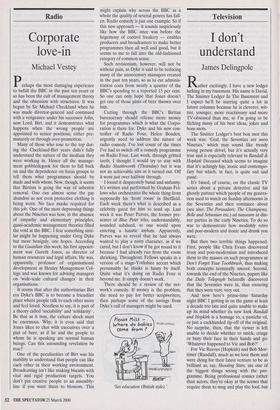Radio
Corporate love-in
Michael Vestey
Perhaps the most damaging experience to befall the BBC in the past ten years or so has been the cult of management theory and the obsession with structures. It was begun by Sir Michael Checkland when he was made director-general and continued with a vengeance under his successor John, now Lord, Birt, and it demonstrates what happens when the wrong people are appointed to senior positions, either pre- maturely or through over-promotion.
Many of those who rose to the top dur- ing the Checkland-Birt years didn't fully understand the nature of the medium they were working in. Hence all the manage- ment gobbledegook for them to fall back on and the dependence on focus groups to tell them what programmes should be made and with whom. Now, though, it seems that Birtism is going the way of asbestos removal. One can almost sense the gay abandon as not even protective clothing is being worn. No face masks required for this job. One of the most depressing things about the Nineties was how, in the absence of empathy and elementary principles, quasi-academic management theories filled the void at the BBC. I fear something simi- lar might be happening under Greg Dyke but more benignly, one hopes. According to the Guardian this week, his first appoint- ment was Gareth Jones, as director of human resources and legal affairs. He was, apparently, professor of organisational development at Henley Management Col- lege and was known for advising managers on 'wide-scale cultural changes' in their organisations.
It seems that after the authoritarian Birt era Dyke's BBC is to become a friendlier place where people talk to each other more and feel loved. Needless to say, it is part of a theory called 'sociability' and 'solidarity'. Be that as it may, the culture shock must be enormous. Why, it is even said that Jones likes to chat with executives over a pint of beer, as if he and the people to whom he is speaking are normal human beings. Can this astounding revelation be true?
One of the peculiarities of Birt was his inability to understand that people can like each other in their working environment. Broadcasting isn't like making biscuits with vital and rigid production targets. You don't pin creative people to an assembly- line if you want them to blossom. This might explain why across the BBC as a whole the quality of several genres has fall- en. Radio comedy is just one example. So if this new approach — it sounds suspiciously like how the BBC once was before the hegemony of control freakery — enables producers and broadcasters to make better programmes then all well and good, but it seems to me to fall into the old-fashioned category of common sense.
Such revisionism, however, will not be without pain, as Dyke is said to be reducing many of the unnecessary managers created in the past ten years, so as to cut adminis- tration costs from nearly a quarter of the BBC's spending to a reported 15 per cent. So one can only hope that Jones doesn't get one of those pints of beer thrown over him.
Cutting through the BBC's Birtian bureaucracy should release more money for programmes which is what the Corpo- ration is there for. Dyke and his new con- troller of Radio Four, Helen Boaden, urgently need to address the nature of radio comedy. I've lost count of the times I've had to switch off a comedy programme on Radio Four. Last week, through gritted teeth, I thought I would try to stay with Radio Shuttleworth (Thursday) but it was not an achievable aim as it turned out. Off it went just over halfway through.
I found it desperately banal and unfunny. It's written and performed by Graham Fel- lows who orchestrates the whole thing from supposedly his 'front room' in Sheffield. Each week there's what is described as a celebrity guest for him to send up. Last week it was Peter Purves, the former pre- senter of Blue Peter who, understandably, sounded subdued, as one would upon entering a lunatic asylum. Apparently, Purves was to reveal that he had always wanted to play a nasty character, as if we cared, but I don't know if he got round to it because I had already run from the room shrieking. Throughout, Fellows speaks in a version of a stage-Yorkshire accent which presumably he thinks is funny by itself. Quite what it's doing on Radio Four is beyond me. It simply doesn't work.
There should be a review of the net- work's comedy. If money is the problem, the need to pay for better scriptwriters, then perhaps some of the savings from Dyke's cull of managers might be used.
'Sex education (British style).'


































































 Previous page
Previous page